Supplements and multivitamins have become a common part of our diets. Since our food intake varies day to day and is not always entirely healthy, it is often important to add supplements in order to meet nutritional requirements. However, the question is, does this also stand true for our beloved pets? Do dogs also need supplements?
Are Dog Supplements Important?
The answer is surrounded by a lot of debate. Some argue that dog supplements should not be used, since dog food is designed to provide all the required nutrition. However, about one-third of all dog owners prefer to add dog supplements, and there are experts who highly recommend them on the grounds that a dog might be missing some essential vitamins from their diet, just like humans do. They explain that a commercial dog food may not always provide for all of a dog’s nutritional needs.
It is also important to note that different dogs have different needs; not all dog food contain similar nutritional value, therefore their nutritional requirements also vary. This is where dog supplements come in handy. Additionally, they are especially beneficial for dogs with specific conditions or problems, like skin problems or arthritis, which dog food on its own cannot solve.
Needless to say, however, supplements work best when used appropriately and moderately. They are best used in the following conditions:
- Your dog is used to home-cooked food, or a mix of home-cooked and commercial food.
- Your dog has a nutrient deficiency or a disease that can be improved with supplements.
- Your dog refuses to eat properly, due to ageing or sickness.
Supplements Recommended for Health Issues
While dog supplements cannot act like medication to entirely cure diseases, they are useful in pacifying the symptoms of many and preventing certain conditions from worsening. Here are a few dog supplements that have been proven to be highly useful:
Glucosamine and Chondroitin
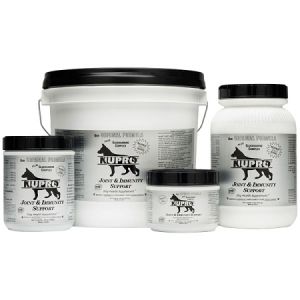
These are the two most popular dog supplements. They are particularly effective for arthritis, elbow and hip dysplasia, and other joint pains. It is recommended that you use a reliable glucosamine formula, like Nupro Joint & Immunity Support Dog Supplements.
Fish Oil
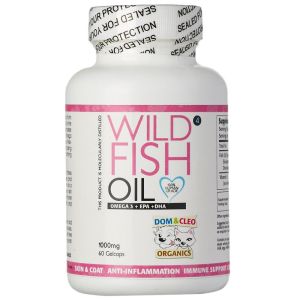
As a great fatty acid, fish oil has multiple uses. It can improve skin and coat, which can be useful for dogs suffering from problems like itching or a lacklustre coat due to allergies, sickness or ageing. Its high content of Omega-3 fatty acids such as EPA & DHA also strengthens the immune system and improves cognitive function. Additionally, it reduces inflammation, which has been known to help kidney disease and pain-causing health conditions like arthritis and other joint problems. Dom & Cleo Wild Fish Oil is a great choice as its uses human grade fish oil from fishes caught in Norway!
Vitamin E
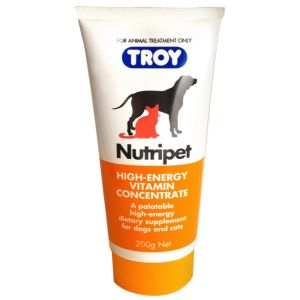
Great for the immune system, Vitamin E also helps with cardiac health is often recommended for dogs that may be at a risk of cardiac disease. It is also great for the eyes, the skin and for muscle health. A great example is TROY Nutripet Vitamin Concentrate Paste, which includes not just Vitamin E, but Vitamin A, D, B1, B2, B6, B12, Calcium, Iron, and Magnesium among other nutrients. Not only does it increase your dog’s appetite, it also keeps them healthy, boosted with energy and protected from common infections. Highly recommended for ageing, young and/or ailing pets!
Vitamin C

Although dogs naturally produce Vitamin C and might not always need it, it can be beneficial in cases of viral infections. If your dog is prone to catching a cold or getting a cough, Vitamin C can be a good idea. Eating oranges now and then are good for you and your pup! Just remember to only share a little with them.
Biotin
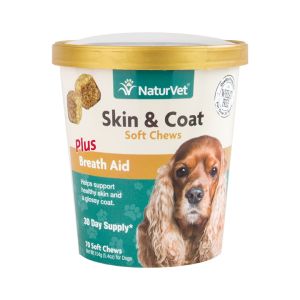
Although biotin deficiency is rare, the supplement can be used regardless. Also known as Vitamin H, it is very effective in improving the skin and fur, and works especially well for dryness and itchiness. NaturVet Skin & Coat Plus Breath Aid Soft Chews are enriched with this useful coenzyme, and are soft enough for dogs of all ages to chew on.
Probiotics
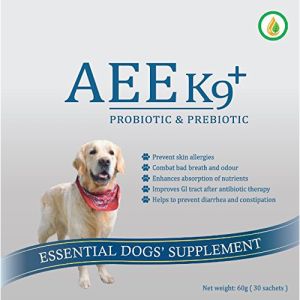
These can be used safely for digestive health and maximised immunity, and must not be used only in case of a deficiency or problem. Probiotics are live bacteria that keep your dog’s gastrointestinal tract healthy and functioning. AEE K9+ Probiotic & Prebiotic, for example, is great for digestive health, and can be easily added to any food. Just sprinkle the powder onto your dog’s food!
Rosemary

Popular as an organic supplement, rosemary is high in iron, vitamin B6 and calcium, and can effectively provide for these deficiencies. It acts as a great antioxidant and can also be used as a flavor enhancer in home-cooked food.
Coconut Oil
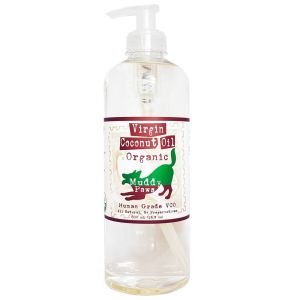
Another natural supplement, coconut oil is safe to use both externally on skin, and internally through consumption. Coconut oil has antifungal and antibacterial properties which can help with infections, skin dryness and digestive problems. It has also been found to be able to control inflammation and, in some cases, give dogs a much needed energy boost. Muddy Paws Organic Virgin Coconut Oil comes in a pump bottle which makes it convenient to dispense, whether as a moisturiser or a food topper!
Pumpkin
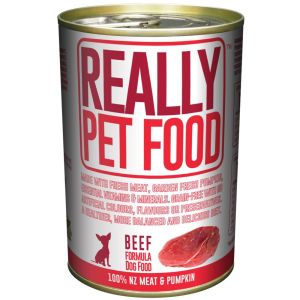
High in dietary fibre, pumpkin can be used for gastrointestinal and digestive problems. In addition to prebiotic/probiotics, an increasing number of dog owners use pumpkin as a home remedy for the occasional constipation or diarrhoea. This low-calorie vegetable is also recommended for dogs with obesity issues as it makes them feel full without the extra calories. Really Pet Food canned dog food contains a high amount of pumpkin; its long shelf life makes it easy to have on hand at all times.
Yogurt
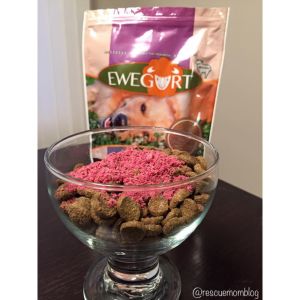
Plain unsweetened Greek yogurt makes for an excellent calcium source. The best part is, you can get it from almost any supermarket (just remember to take note of its expiry date)! Rich in protein and probiotics, Greek yogurt usually has no additives and is not harmful at all, unless your dog is lactose intolerant (we’ve heard many stories of dogs farting non-stop after eating some!). To avoid getting a smelly surprise, try a lactose-free option like Ewegurt Sheep’s Milk Yogurt treats. You can dissolve it into water to make a yummy beverage, sprinkle it on your dog’s food, or feed it as a tasty treat.
Multivitamins
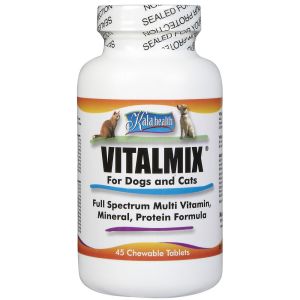
Regardless of whether your dog is suffering from any health problems, multivitamins are a good way to give your dogs all the vitamins they need. Kala Health Vitalmix Full Spectrum Multi Vitamin, Mineral, Protein Supplement not only contains 14 vitamins, it contains 21 amino acids and 11 minerals as well!
You might have to choose the supplements you add based on the type of diet you are feeding to your dog. If you are feeding dry kibble, fatty acids and some organic supplements like yogurt work best. You might also be able to scatter capsule powder on top of dry food, since it is bitter on its own and your dog will probably not eat it otherwise.
Fatty acids like fish oil as well as all supplements in capsule forms can also be used with raw food, while almost any supplement can be added to home-cooked food. You might also be able to feed some pills directly, though most will be too bitter and might be spat out.
Dangers Associated with Supplementation
As previously mentioned, dog supplements work best when moderately used with the recommendation of an expert. Under-supplementation can often be dangerous, since certain conditions like arthritis almost always need additional supplements and can worsen without them. The lack of essential nutrients can cause your dog to fall ill and experience low energy; lifelong deficiencies can cause premature ageing.
However, over-supplementation also has its dangers. Here are some things to keep in mind.
- Multivitamins should not be given to dogs that already have a completely balanced diet.
- Some additional vitamins, like Vitamin C, are harmless and will just pass through a dog’s system. However, others can be harmful. Over-supplementation of fat-soluble vitamins like Vitamin A, D, E and K can cause the buildup of harmful toxins. Similarly, too much calcium can cause skeletal as well as kidney problems.
- Dog supplements don’t have specific side effects, but just like humans, some dogs may react differently. If your dog is reacting poorly to supplement intake and showing signs like loss of appetite or lethargy, or seems to have developed a new condition, abort use immediately.
Therefore, it is always ideal to consult an expert vet before beginning supplementation and ensuring your dog is getting the best.
